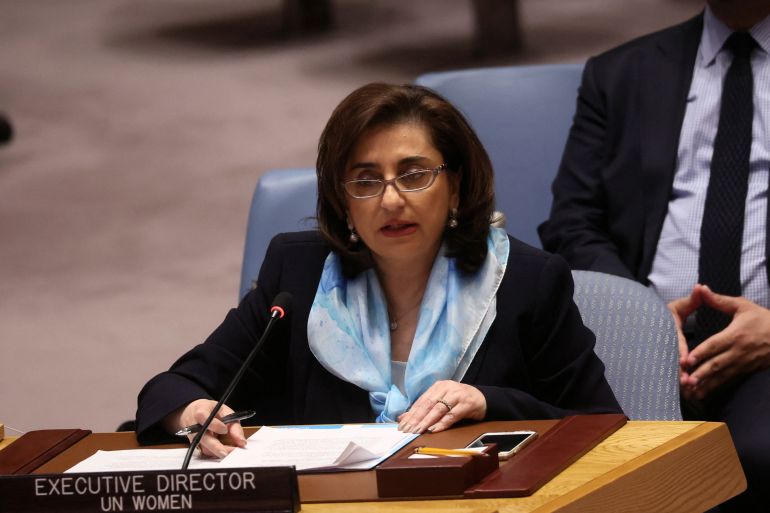UN calls for independent investigation into rape in Ukraine
Executive Director for UN Women Sima Bahous says allegations of rape and sexual violence by Russian troops must be independently verified.

The United Nations has demanded an independent investigation into rape and sexual violence in Ukraine, after allegations Russian troops committed such crimes during the continuing invasion of the neighbouring country.
“We are increasingly hearing of rape and sexual violence. These allegations must be independently investigated to ensure justice and accountability,” Executive Director for UN Women Sima Bahous told a UN Security Council briefing late on Monday.
Keep reading
list of 4 itemsUkraine war latest updates: ‘20,000 civilians killed in Mariupol’
Kyiv warns Russia planning large assault in eastern Ukraine
Who is the general leading Russia’s new war strategy in Ukraine?
“The combination of mass displacement with the large presence of conscripts and mercenaries, and the brutality displayed against Ukrainian civilians, has raised all red flags,” she said.
Bahous added she had recently returned from the Republic of Moldova, where she spoke to women and children arriving from Ukraine.
Kateryna Cherepakha, president of the La Strada organisation, which tackles gender-based violence, told the UN council via video call that “rape is used as a weapon of war by Russian invaders in Ukraine”.
Cherepakha said witnesses spoke of Russian officers carrying out rapes in front of children and family members and threatening the lives of their victims.
Russia has denied the allegations. “No convincing evidence has been presented for any of these crimes, but it’s understandable that you have trampled the presumption of innocence a long time ago,” Dmitry Polyanskiy, Russian deputy ambassador to the UN, told the council.
‘Hundreds of cases of rape’
Ukrainian President Volodymyr Zelenskyy on Tuesday said investigators had received reports of “hundreds of cases of rape” in areas previously occupied by Russian troops, including sexual assaults of small children.
“In areas freed from the occupiers, the recording and investigation of war crimes committed by Russia continues. Almost every day we find new mass graves,” he told Lithuanian lawmakers via video link. “Hundreds of cases of rape have been recorded, including those of young girls and very young children. Even of a baby!”
Ukraine’s UN ambassador Sergiy Kyslytsya alleged Russia had disregarded the need to protect civilians in Ukraine and called for a full and transparent investigation of crimes against women and children.
Rights groups including Human Rights Watch (HRW) and Amnesty International have spoken to witnesses describing similar crimes.
A HRW report last week said a 31-year-old woman was raped several times on March 13 by a Russian soldier, while sheltering together with her family in a school in the Kharkiv region.
The next day the woman fled to the city of Kharkiv, where she was able to get medical treatment and other services. The watchdog reviewed two photographs the woman took of her facial injuries.
Amnesty also denounced the killing of civilians and rapes, including the case of a woman in a village east of Kyiv whose husband was killed on March 9 by Russian troops, who then repeatedly raped her at gunpoint while her young son hid in a boiler room nearby.
The woman was able to escape from the village to Ukrainian-controlled territory with her son, according to Amnesty.
Russia’s justice ministry last week canceled the registration of Amnesty, HRW and 13 other international organisations citing “the discovery of violations of the current legislation of the Russian Federation”.
Russian troops invaded Ukraine on February 24, but its forces have now fully withdrawn from around the capital, Kyiv, and northern Ukraine. The Ukrainian government says it expects Russia to launch a huge new offensive soon in the east of the country.
Commenting on the scale of the destruction in 48 days of war, Manuel Fontaine, director of the Office of Emergency Programmes at UNICEF, told the UN council “in 31 years as a humanitarian [worker] I’ve rarely seen so much damage caused in so little time”.